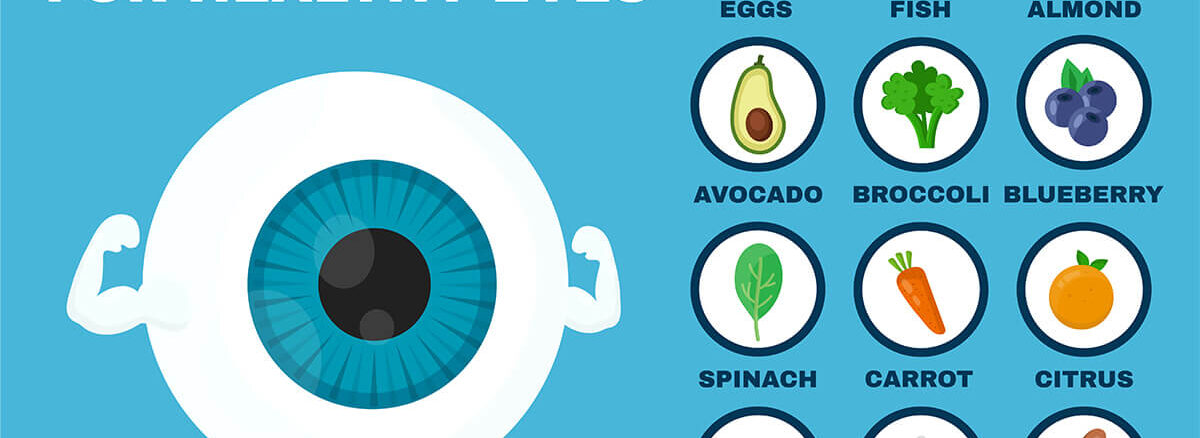There is evidence to show that a healthy diet prevents the development of eye conditions, although this link isn’t as strong as it is for other conditions such as heart disease. However, eating a healthy balanced diet rich in fruit and vegetables may help to keep your eyes as healthy as they can be. How your diet may affect your eye condition depends a lot on the eye condition you have been diagnosed with.
Age-related macular degeneration
The nutritional supplements concerned with AMD are the antioxidant vitamins A (which our bodies convert from beta-carotene in our diets), C and E, as well as the trace element zinc and the micronutrients lutein and zeaxanthin. Lutein and zeaxanthin are naturally found as pigments in the macula.
It is thought that antioxidants are helpful in AMD because of the “free radical” theory of cell damage. This is that over your lifetime, free radicals, highly reactive substances created in your body by breathing, eating and by other factors such as air pollution and smoking tobacco, cause damage to the cells in your body. This is the “wear and tear” we call ageing.
Antioxidants are thought to help by “mopping up” these free radicals, to delay or prevent them from damaging your cells. Research into supplements for AMD has therefore looked at whether or not antioxidants can help to protect the macula from these age-related changes.
Two recent large scale studies carried out in America called the Age Related Eye Disease Studies (AREDS and AREDS2) explored the role of these antioxidants in slowing down the progression of AMD in people already diagnosed with the condition. AREDS and AREDS2 found that for some people with AMD, taking an antioxidant formula did slow down the progression of their condition.however it is advisable to discuss this with your GP or ophthalmologist before starting any supplements .
Cataract
The most common type of cataract occurs as you get older. Cataracts develop because as you age the lens of your eye changes in response to the natural ageing process. This means that your once clear lens becomes cloudy.
Although getting older is the strongest risk factor for developing a cataract, some studies have shown that a healthy diet rich in antioxidants containing foods may decrease the risk of developing cataracts. Other studies seem to show that taking some vitamins and minerals may be protective against developing cataracts.
However, at present evidence is varied and there are currently no clear answers regarding diet and supplements to prevent age-related cataracts. Therefore, it may be the case that a healthy diet rich in antioxidants containing foods such as fruits and vegetables, may also help prevent or slow down cataracts, as well as being beneficial to our general health.
Dry Eye
Dry eye is a common condition where there may be a problem with your tears that usually keep your eyes comfortable and moist. Clinical trials have shown that omega 3, a group of fatty acids that we get from our diets, can have a positive effect on the symptoms of dry eye when taken in certain quantities.
Omega 3 can be obtained from our diet by eating oily fish such as anchovies, herring, mackerel, salmon, sardines, trout, herring and fresh tuna. The NHS recommends that we eat at least two portions of fish a week, including one of oily fish. If you do not eat fish you can also get omega 3 by eating flaxseed/linseed or rapeseed oils and soya foods such as tofu, as well as walnuts and eggs enriched with added omega 3.
Taking omega 3 supplements have also been found to help with the symptoms of dry eye in some trials. However, as with all supplements these may not be suitable for everyone and if you are thinking of taking omega 3 supplements for dry eye it would be important to discuss this with your GP or ophthalmologist (eye specialist) before starting.
If you have any concerns about your diet you may want to discuss these with your GP who should be able to give you more advice about healthy eating.
